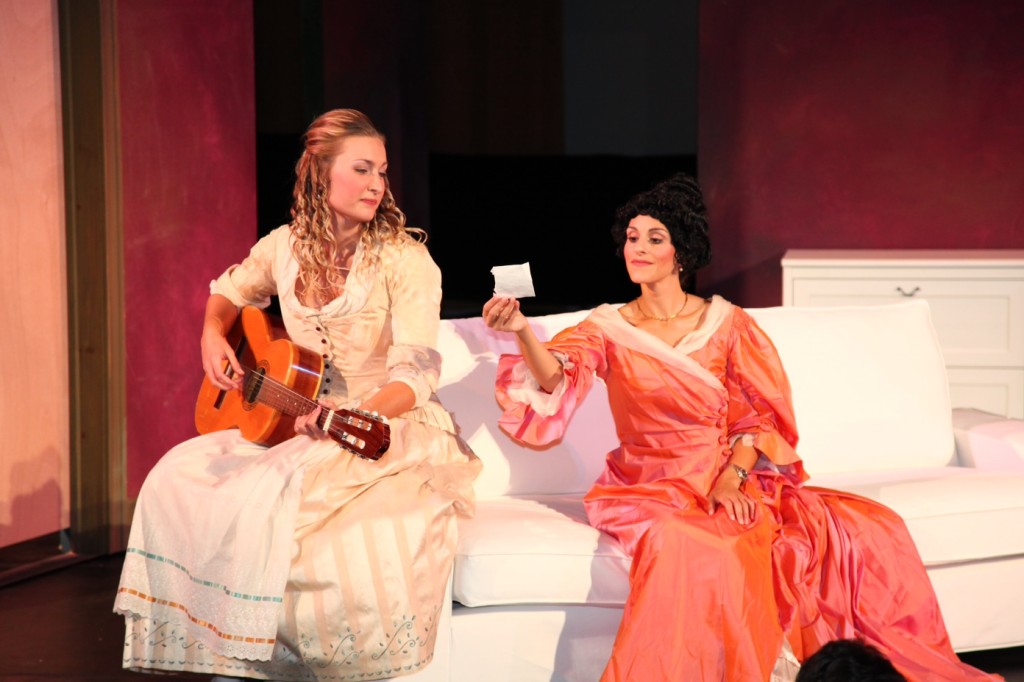Frost Opera Theater serves up a delightful “Figaro”

Kathryn Kupchik as Susanna (left) and Rebecca Henriques as the Countess in Frost Opera Theater’s production of Mozart’s The Marriage of Figaro.”
Mozart’s The Marriage of Figaro is a timeless masterpiece that is replete with many levels of complexity. Both a comedic farce and darker parable about servants outwitting their masters conceived by playwright Beaumarchais on the eve of the French revolution, the opera is also a study of the foibles and sometimes fickle adventurousness of the human heart.
Lorenzo da Ponte managed to create a nearly perfect operatic libretto that complements the light and dark shadows of Mozart’s effervescent score. The production by the Frost Opera Theater that opened Thursday night at the University of Miami’s Gusman Hall manages to encompasses much of the opera’s wit and wisdom, fielding a gifted student cast with promising voices and strong theatrical instincts.
This production is also a farewell for Dean Southern, whose ingenuous staging of contemporary works has been a highlight of recent Frost Opera seasons. Southern is returning to his former position on the faculty of the Cleveland Institute of Music.
In the best tradition of French farce, Southern directs a fast-paced romp, characters appearing and exiting through doors and openings in rapid formation. He also strongly differentiates the characters and their uneasy relationships under the palatial dome, the final masquerade both funny and poignantly truthful. The shadow play of Herman Montero’s lighting adds a touch of magic to the staging. Robert Perdziola’s gorgeous period costumes from the Santa Fe Opera contrast sharply with Mark Kobak’s contemporary settings, underscoring the opera’s dichotomy between ancient and modern in deliberately stark terms.
Most of the major roles are double cast, the singers alternating on successive evenings. The well-coached opening-night cast was consistently strong with two standout performances that could grace any operatic stage.
An aristocratic and regal Countess Almaviva, Rebecca Henriques’ exquisite lyric soprano spun Porgi amor and Dove sono in a creamy, lustrous stream of tone. Her engaging stage presence and ease in coloratura lit up the intricate ensemble scenes. Henriques’ soaring letter duet with Kathryn Kupchik’s Susanna was one of the highlights of the evening. As the amorous page Cherubino, Katherine Wiggins brought a richly colored mezzo and deft comic timing, her antics stealing the scene at every turn. Wiggins’ two arias, delivered with scrupulously classical stylishness, exuded personality and charisma.
Kupchik was saucy and impishly mischievous as Figaro’s bride. Her attractive light soprano blended well in duets and proved particularly adept in lightening fast recitative. Her high range turned somewhat edgy in Deh vieni, non tardar but she sang and acted the final scene with the spot-on timing of a true comedienne.
Claudio Valverdi was the buffo Figaro, a born comic with warm and resonant sonority, the voice solidly produced down to the lowest notes. Jeffrey Wienand was both a lecherous and arrogant Count Almaviva, a man of privilege brought down by his overreaching sexual escapades. Wienand’s sonorous baritone easily encompassed the Count’s raging exclamations but he also brought tenderness and subtle hues to his plea for forgiveness.
Hillary Trumpler was the scheming Marcellina, charming and sharply etched. Eric McConnell’s Bartolo exuded the doctor’s crafty malevolence and survivor instincts but he lacked the deep bass timbre for La vendetta. In the double roles of Basilio and Don Curzio, Justin John Moniz had limited opportunities to display his fine lyric tenor but excelled in the comedic interplay. Alissa Roca was a delightful Barbarina, bringing unusual sweetness to her brief aria that sets up the final scene.
Except for a few early wind burbles, the thirty members of the Frost Symphony Orchestra played with brio and precision. Alan Johnson’s lithe conducting did not neglect the score’s subtle emotional undertones and his careful detailing of dynamics and balances did justice to Mozart’s remarkable instrumental writing.
The Frost Opera Theater repeats The Marriage of Figaro 7:30 p.m. Friday and Saturday and 3 p.m. Sunday. Thomas Sleeper conducts the Friday and Sunday performances. 305-284-4886; www.music.miami.edu.
Posted in Performances
One Response to “Frost Opera Theater serves up a delightful “Figaro””
Leave a Comment
Fri Apr 20, 2012
at 12:30 pm
1 Comment







Posted May 07, 2012 at 12:05 am by Dorothea LaFrieda
This was a wonderful review for its incisiveness, perceptiveness, and keen grasp of the historical background. You have captured the essence of each of the performances with your astute assessments.
What a delightful review!